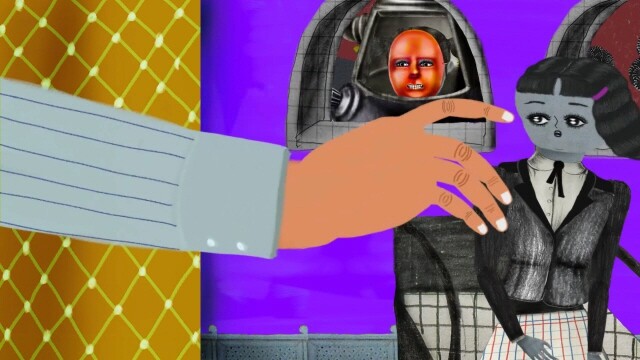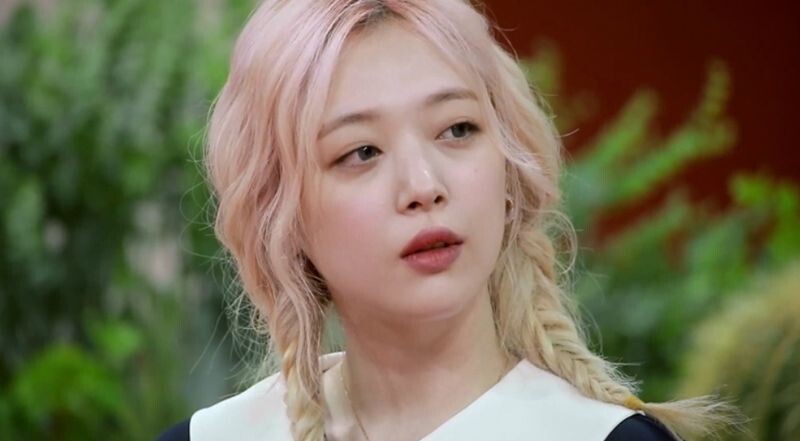hankyoreh
Links to other country sites 다른 나라 사이트 링크
Death of popular entertainment sparks anger young S. Korean women

The sudden death of a female entertainer has plunged South Korean society into anguish. Following reports that singer and actor Sulli (real name Choe Jin-ri, 25) was found dead on the afternoon of Oct. 14, women in their 20s and 30s— who are part of the same generation and have followed a similar course of life — vented their confusion and anger at society. There’s a growing consensus that the various criticisms leveled at Sulli were tacitly permitted by Korean society and represent the daily struggle faced by women of that same generation.
Upon hearing the news, a 31-year-old self-employed woman named Yu Ji-eun posted a long essay on her Facebook page: “Is Sulli’s death really the death of an entertainer? The things she suffered since her debut weren’t all as bad, but as a woman I’m fully capable of understanding her pain. The whispers about her gaining weight, the rude sexual jokes after she got a boyfriend, the sneers and ogling when she dressed up in something sheer [. . .] Sulli was the victim of a social homicide.” Just 20 hours after going up, the post had gotten quite an audience, with more than 2,300 likes.
“Sulli was an ordinary woman trying to find her own way, but she was also a woman who spoke her opinions with conviction. Seeing that she couldn’t survive in this society made me feel some severe social anxiety,” Yu said in a telephone interview with the Hankyoreh on Oct. 15.
A 29-year-old office worker surnamed Chun had a similar perspective. “I thought of Sulli as an important artist who was deconstructing prejudices about women in our society. I thought of her as an icon of her age who deserved respect for expressing the freedom that’s necessary for women to be recognized as human beings in their own right. But seeing people criticize her made me realize the terrible fact that I’m unable to completely reveal who I am as a woman in this society,” she said.
A 27-year-old job-seeker surnamed Nam said, “What shocked me about this whole thing was that Sulli, as least on the surface, had seemed so sure of herself and committed to doing things her way. But the online attacks and bullying were too much for even her to put up with.”
There’s nothing new about the collective shaming of female entertainers, which often consists of making offensive sexual remarks about their appearance and outfit and by manufacturing and spreading all kinds of rumors and scandals. In recent years, such attacks have tended to focus on women who are vocal about their opinions. When female celebrities such as Seo Ji-hye and Kim Ok-bin posted on social media that they’d read “Kim Ji-young, Born 1982,” a fictional account of the things that young women suffer in Korean society, they were subjected to a barrage of hostile comments.
Son Na-eun, a member of girl group Apink, faced a similar attack when she posted a picture of a mobile phone case with the message “girls can do anything” to her Instagram. Son had to hurriedly explain that she’d been given the case by a fashion brand.
“The moment a celebrity declares she’s going to talk candidly about her own desires instead of serving as a proxy for the desires of others, adoring fans suddenly pull out their knives. ‘You’re supposed to live for my desires, so why are you doing things that bother me as if you had a life of your own? That’s a breach of contract,’ they scream,” said Lee Seung-hang, a TV columnist, in a piece submitted to online magazine Channel Yes.
“Those knives are especially sharp when the target is a young female celebrity. They want such women, whom they label as ‘doll’ or ‘goddess,’ to be a safe repository for their desires, while refraining from anything irritating,” Lee wrote.

Denying women agency
This illustrates that Korean society is still obsessed with the objectification of women, while denying them agency. “The female celebrities who have been subjected to public shaming have exercised agency over their own sexuality. The masses don’t want female celebrities to express their opinions; they’re only interested in celebrities’ appearance, in how they can make themselves beautiful. When female celebrities’ ideas clash with those of the masses, that very act is treated as a crime. Anger at women who refuse to ‘act cute’ and forced apologies from women who don’t ‘talk sweet’ are all examples of that,” said Kwon-Kim Hyeon-yeong, a scholar of women’s studies.
Those ideas were echoed by a 28-year-old woman surnamed Choi, who is currently looking for a new job. “Women are forced to take on the image preferred by the masses, as if they weren’t people but objects that needed to be repackaged. When women take steps to reject that image, I’ve often seen critics gang up on them online, unreasonably trying to get their way as consumers,” she said.
Some blame these problems on clickbait media outlets that run voyeuristic stories about celebrities. The media has also been criticized for not showing the slightest restraint in its coverage of the death of Sulli. The initial version of a story by the Kukmin Ilbo, a daily newspaper, called Sulli “an advocate of not wearing a bra,” a phrase that was eventually pulled. Entertainment media outlet SPOTV News also angered viewers when it tagged an article about Sulli’s wake as being a “scoop.”
By Oh Yeon-seo and Kwon Ji-dam, staff reporters
Please direct comments or questions to [english@hani.co.kr]

Editorial・opinion
![[Column] Season 2 of special prosecutor probe may be coming to Korea soon [Column] Season 2 of special prosecutor probe may be coming to Korea soon](https://flexible.img.hani.co.kr/flexible/normal/500/300/imgdb/original/2024/0426/3317141030699447.jpg) [Column] Season 2 of special prosecutor probe may be coming to Korea soon
[Column] Season 2 of special prosecutor probe may be coming to Korea soon![[Column] Park Geun-hye déjà vu in Yoon Suk-yeol [Column] Park Geun-hye déjà vu in Yoon Suk-yeol](https://flexible.img.hani.co.kr/flexible/normal/500/300/imgdb/original/2024/0424/651713945113788.jpg) [Column] Park Geun-hye déjà vu in Yoon Suk-yeol
[Column] Park Geun-hye déjà vu in Yoon Suk-yeol- [Editorial] New weight of N. Korea’s nuclear threats makes dialogue all the more urgent
- [Guest essay] The real reason Korea’s new right wants to dub Rhee a founding father
- [Column] ‘Choson’: Is it time we start referring to N. Korea in its own terms?
- [Editorial] Japan’s rewriting of history with Korea has gone too far
- [Column] The president’s questionable capacity for dialogue
- [Column] Are chaebol firms just pizza pies for families to divvy up as they please?
- [Column] Has Korea, too, crossed the Rubicon on China?
- [Correspondent’s column] In Japan’s alliance with US, echoes of its past alliances with UK
Most viewed articles
- 1AI is catching up with humans at a ‘shocking’ rate
- 2After election rout, Yoon’s left with 3 choices for dealing with the opposition
- 3[Column] Season 2 of special prosecutor probe may be coming to Korea soon
- 4No good, very bad game for Korea puts it out of Olympics for first time since 1988
- 5Korea’s 1.3% growth in Q1 signals ‘textbook’ return to growth, says government
- 6Is Japan about to snatch control of Line messenger from Korea’s Naver?
- 7[Column] Park Geun-hye déjà vu in Yoon Suk-yeol
- 8Division commander ordered troops to enter raging flood waters before Marine died, survivor says
- 9Marriages nosedived 40% over last 10 years in Korea, a factor in low birth rate
- 10‘We must say no’: Seoul defense chief on Korean, USFK involvement in hypothetical Taiwan crisis